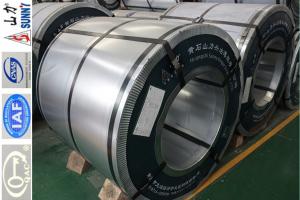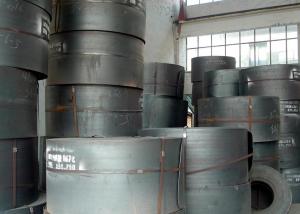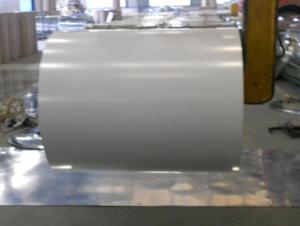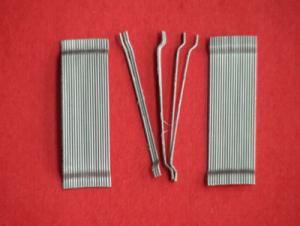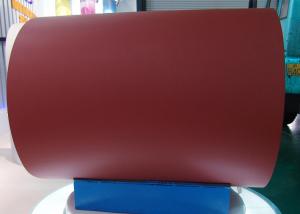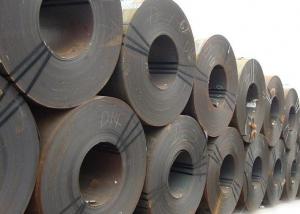GALVANIZED STEEL STRAND
- Loading Port:
- China Main Port
- Payment Terms:
- TT OR LC
- Min Order Qty:
- -
- Supply Capability:
- -
OKorder Service Pledge
OKorder Financial Service
You Might Also Like
1、STANDARDS
GB/T 1179
QB/HYT002
YB/T 5004
GB/T 3428
ASTMB802、 ASTMB803、 ASTMA855、 ASTMA925、 ASTMB957
2、MATERIAL
55#,60#,65#,70#,72A,80#,77B,82B
3、 PACKING
WOOD SPOOL Z2
4、
MECHANICAL PROPERTY OF EXTRA-HIGHTENSILE STEEL WIRE
(mm)Size |
(mm) Tolerance | /Mpa Stress at 1% extension min | /Mpa Tensile strength min | */% Elongation min | mm Wrapping test standard core dia. | Torsion test min / number of turns | |
> | ≤ | ||||||
1.24 | 2.25 | ±0.03 | 1550 | 1870 | 2.0 | 4D | 14 |
2.25 | 2.75 | ±0.04 | 1550 | 1870 | 2.0 | 4D | 14 |
2.75 | 3.00 | ±0.05 | 1550 | 1870 | 2.5 | 5D | 12 |
3.00 | 3.50 | ±0.05 | 1550 | 1870 | 2.5 | 5D | 12 |
3.50 | 4.25 | ±0.06 | 1550 | 1870 | 2.5 | 5D | 10 |
4.25 | 4.75 | ±0.06 | 1510 | 1870 | 2.5 | 5D | 10 |
4.75 | 5.50 | ±0.07 | 1510 | 1870 | 2.5 | 5D | 10 |
Minimun elongation is based on gauge length l0 = 250mm.
Torsion test is based on a standard length of 100 wire diameters.
- Q: What are the different types of steel angles and their applications?
- There are several types of steel angles commonly used in construction and manufacturing. These include equal angles, unequal angles, L-shaped angles, and T-shaped angles. Equal angles have equal leg lengths and are often used in structural applications, such as supporting beams and columns. They provide stability and strength, making them suitable for various load-bearing purposes. Unequal angles have different leg lengths and are commonly used in situations where additional strength or support is required. They are often used in framework construction, bracing, and as support brackets. L-shaped angles, also known as angle irons, are versatile and widely used in various industries. They are commonly utilized as structural elements, framing components, and supports for shelves, tables, and furniture. T-shaped angles, also called T-sections or T-bars, have a cross-shaped profile. They are utilized in construction and engineering projects that require additional strength and stability, such as in the construction of bridges, buildings, and machinery. Overall, the different types of steel angles offer a range of applications, including structural support, framework construction, bracing, and reinforcement in various industries.
- Q: How do steel products contribute to the electrical and power transmission sector?
- Steel products play a crucial role in the electrical and power transmission sector by providing the necessary infrastructure to support and transmit electricity efficiently. Steel is used in the construction of transmission towers, poles, and substations, which form the backbone of power transmission networks. These products provide the necessary strength and durability to withstand extreme weather conditions and support high-voltage power lines. Additionally, steel is also used in the manufacturing of electrical transformers, generators, and turbines, which are essential components of power generation and distribution systems. Overall, steel products contribute significantly to the reliability and effectiveness of the electrical and power transmission sector.
- Q: What are the different types of steel rods and their applications?
- There are several types of steel rods available, each with its own unique properties and applications. Some common types include carbon steel rods, stainless steel rods, and alloy steel rods. Carbon steel rods are widely used in construction and manufacturing due to their high strength and durability. Stainless steel rods are resistant to corrosion and are often used in industries such as food processing and medical equipment manufacturing. Alloy steel rods, on the other hand, are designed to have specific mechanical properties such as increased hardness or improved heat resistance, making them suitable for applications in automotive and aerospace industries. Overall, the choice of steel rod depends on the specific requirements and environment of the application.
- Q: What are the different types of steel products used in the manufacturing of camping equipment?
- The different types of steel products used in the manufacturing of camping equipment include stainless steel for cookware and utensils, carbon steel for knife blades and axe heads, galvanized steel for tent poles and stakes, and alloy steel for camping gear like carabiners and climbing equipment.
- Q: How is steel used in the construction of convention centers and exhibition halls?
- Steel is extensively used in the construction of convention centers and exhibition halls due to its strength, durability, and flexibility. It is commonly used for the structural framework, roofing, and cladding of these large-scale buildings. Steel's high tensile strength allows for the creation of wide-open spaces without the need for excessive support columns or walls, enabling the construction of large exhibition halls and expansive convention centers. Additionally, steel's durability ensures the longevity of these buildings, while its flexibility allows for easy modifications or expansions to suit evolving needs.
- Q: How is steel used in the production of marine vessels?
- Steel is commonly used in the production of marine vessels due to its high strength, durability, and resistance to corrosion. It is used to construct the hull, decks, and other structural components, providing the necessary strength to withstand the harsh conditions of the marine environment. Steel also enables the vessels to carry heavy cargo and withstand the forces exerted by waves and currents. Additionally, steel can be easily welded and shaped, allowing for efficient construction and customization of marine vessels.
- Q: How is steel used in the production of agricultural equipment?
- Steel is used in the production of agricultural equipment due to its durability and strength. It is commonly used to manufacture components such as blades, plows, and machinery frames, as well as storage tanks and containers. The properties of steel make it ideal for withstanding the harsh conditions and heavy usage that agricultural equipment typically endures, ensuring longevity and efficiency in farming operations.
- Q: How is steel used in the construction of data centers?
- Steel is commonly used in the construction of data centers to provide a strong and durable framework. It is used for structural support in the form of beams, columns, and trusses, ensuring the stability and safety of the building. Steel is also utilized in the fabrication of server racks, server cabinets, and equipment enclosures, providing a secure and robust environment for housing data center equipment. Additionally, steel is used in the construction of raised floors, which allow for efficient cable management and provide easy access to power and data connections. Overall, steel plays a crucial role in the construction of data centers by providing the necessary strength, support, and protection for the facilities and equipment.
- Q: What are the different types of steel doors and windows?
- There are several different types of steel doors and windows, including flush doors, panel doors, sliding doors, casement windows, and fixed windows.
- Q: What are the uses of steel in the construction of hotels and resorts?
- Steel is widely used in the construction of hotels and resorts due to its exceptional strength and durability. It serves various purposes such as providing structural support, forming the framework of the building, and reinforcing concrete structures. Steel beams and columns are used to create large open spaces, allowing for flexible and efficient floor plans. Additionally, steel is utilized in the construction of staircases, elevator shafts, and roofing systems. Its fire-resistant properties and ability to withstand extreme weather conditions make it an ideal choice for ensuring the safety and longevity of hotels and resorts.
Send your message to us
GALVANIZED STEEL STRAND
- Loading Port:
- China Main Port
- Payment Terms:
- TT OR LC
- Min Order Qty:
- -
- Supply Capability:
- -
OKorder Service Pledge
OKorder Financial Service
Similar products
Hot products
Hot Searches
Related keywords



















